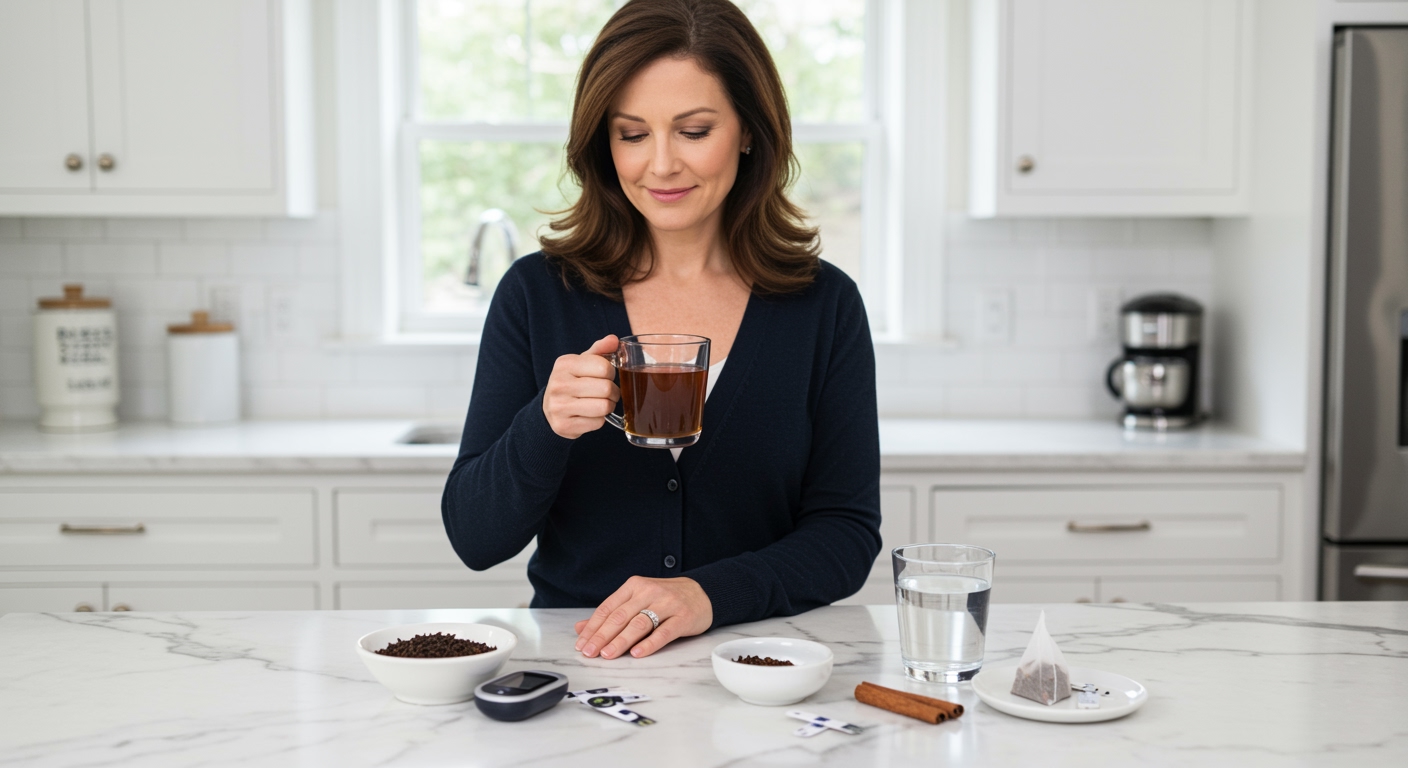✪ Key Takeaway: Black tea can help manage blood sugar levels through antioxidants and may reduce diabetes risk when consumed regularly without added sugars.
Introduction
You reach for that steaming cup of black tea every morning, but have you ever wondered if this daily ritual could be affecting your blood sugar levels?
Many people with diabetes or prediabetes worry about every food and drink they consume, wondering if their favorite beverages might be sabotaging their health goals.
Hi, I’m Abdur, your nutrition coach and today I’m going to explain exactly how black tea affects your blood sugar and whether it can actually help you manage diabetes better.
How Does Black Tea Affect Blood Sugar Levels?
Black tea contains powerful compounds called polyphenols that can significantly impact your blood glucose response.
These natural antioxidants work by inhibiting enzymes that break down carbohydrates in your digestive system.
When these enzymes are slowed down, your body absorbs glucose more gradually, preventing those dangerous blood sugar spikes that can damage your health over time.
Research shows that drinking black tea with meals can reduce the glycemic response by up to 20 percent compared to drinking water alone.
The theaflavins and thearubigins in black tea also improve insulin sensitivity, helping your cells use glucose more effectively.
✪ Pro Tip: Drink black tea 30 minutes before meals to maximize its blood sugar lowering effects.
Can Black Tea Actually Prevent Diabetes?
Large population studies reveal some fascinating connections between regular black tea consumption and diabetes prevention.
A major Australian study found that people who drank at least four cups of tea daily had a 17 percent lower risk of developing type 2 diabetes over a decade.
The protective effects seem to come from the way black tea compounds interact with your metabolic pathways at the cellular level.
These polyphenols activate proteins that help regulate glucose metabolism and reduce inflammation throughout your body.
However, this protection only works when you drink tea without adding sugar, honey, or other sweeteners that would counteract the benefits.
The key is consistency – drinking black tea regularly over months and years appears to provide cumulative protective effects against insulin resistance.
✪ Fact: Black tea contains more diabetes-fighting compounds than green tea due to its fermentation process.
What About Caffeine and Blood Sugar Control?
The caffeine in black tea creates a complex relationship with blood sugar that you need to understand.
In the short term, caffeine can actually cause a temporary increase in blood glucose levels by triggering the release of stress hormones like adrenaline.
This effect is usually mild and lasts only 1-2 hours, but it can be more pronounced in people who are caffeine sensitive or consume large amounts.
However, regular black tea drinkers often develop tolerance to these acute effects, and the long-term benefits of the polyphenols outweigh the temporary caffeine impact.
The key is moderation – stick to 2-4 cups per day and avoid drinking black tea late in the evening when it might disrupt your sleep patterns.
Poor sleep quality can worsen insulin resistance, so timing your tea consumption properly is crucial for optimal blood sugar control.
✪ Note: Monitor your individual response to caffeine as sensitivity varies greatly between people.
How Should You Drink Black Tea for Maximum Benefits?
The way you prepare and consume black tea makes a huge difference in its diabetes-fighting potential.
Always drink your black tea plain, without any added sugars, artificial sweeteners, or milk that could interfere with the polyphenol absorption.
Steep your tea for at least 3-5 minutes to extract the maximum amount of beneficial compounds from the leaves.
The temperature matters too – use water that is just below boiling point (around 200°F) to avoid destroying the delicate antioxidants.
Timing is crucial for blood sugar management – drink black tea with or shortly before meals to get the maximum glucose-lowering effect.
Choose high-quality loose leaf teas over tea bags when possible, as they typically contain higher concentrations of active compounds.
If you must add flavor, try a small amount of cinnamon or lemon, both of which may provide additional blood sugar benefits.
✪ Pro Tip: Store your black tea in an airtight container away from light to preserve its antioxidant potency.
The Bottom Line
Black tea can be a valuable ally in managing blood sugar levels and reducing diabetes risk when consumed properly and consistently.
Small daily choices compound into life-changing health outcomes over time, and adding unsweetened black tea to your routine is one of the simplest yet most effective steps you can take.
I would love to hear about your experience with black tea and blood sugar management – please share your questions, observations, or success stories in the comments below so we can learn from each other.
References
At NutritionCrown, we use quality and credible sources to ensure our content is accurate and trustworthy. Below are the sources referenced in creating this article:
- Asia Pacific Journal of Clinical Nutrition: Tea consumption and diabetes prevention
- PubMed: Black tea polyphenols and blood glucose
- University of Adelaide: Daily dark brew reduces diabetes risk
- WebMD: Diabetes and caffeine effects





